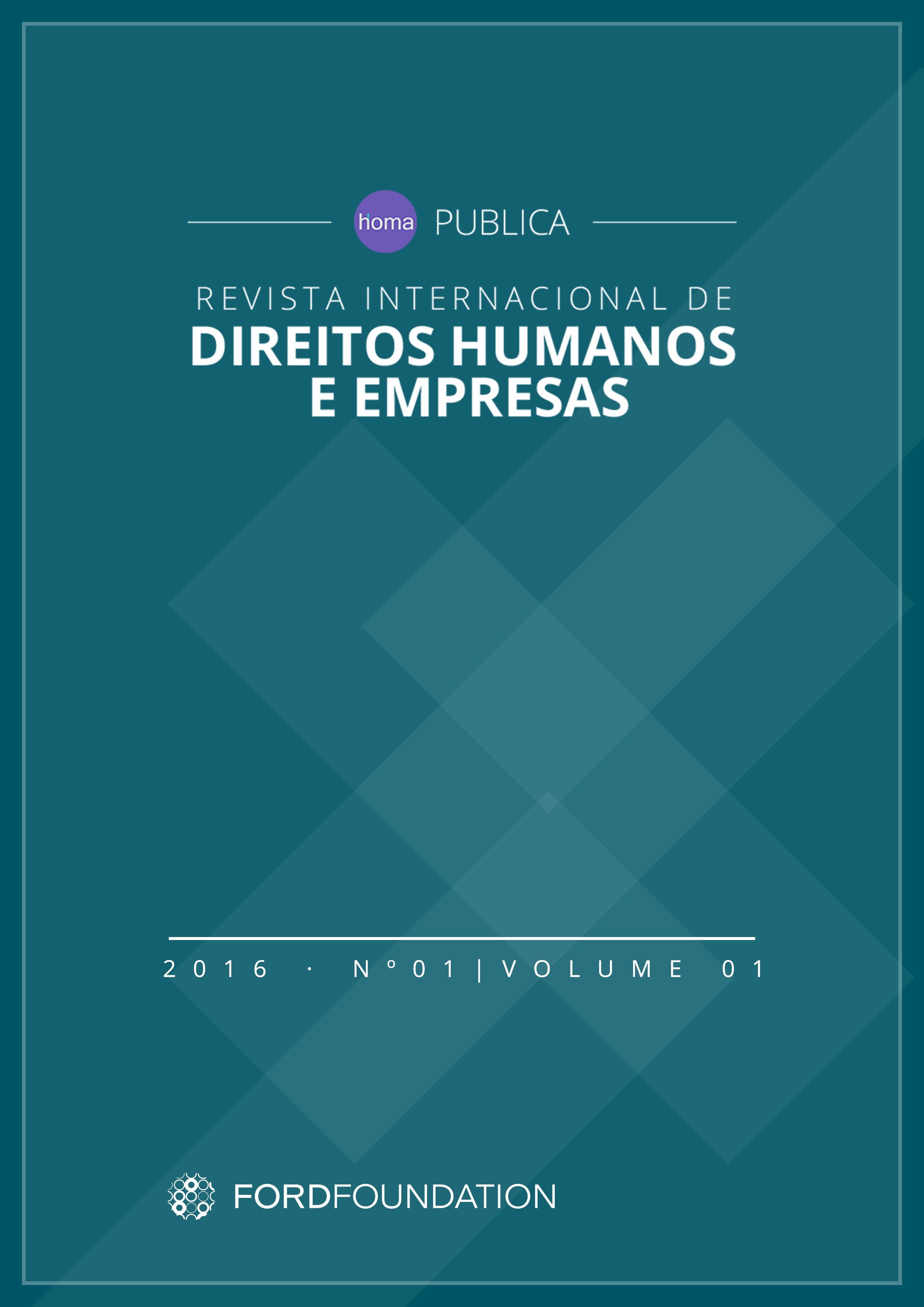Guiding Principles on Business and Human Rights: critical reflections on its implementation and perspectives
Published 2016-11-30
Keywords
- Guinding Principles,
- Business and Human Rights,
- Effetive resources and reparations,
- Human Rights abuses,
- United Nations
How to Cite
Abstract
Five years after the adoption of the Guiding Principles on business and human rights, it is necessary to attempt an assessment of the discourse and practice of States and other actors may seem too early to do so. The Guiding Principles aim to operate a paradigm shift in the performance of companies and how other actors work with companies, privileging multi-stakeholder perspectives and relegating the role of the state. The evidence available to date does not confirm that this is happening. The emphasis on the implementation of the Guiding Principles has focused on political support statements and more recently in measuring progress in implementation. In the past two years, a series of social and political events (including the opening of an intergovernmental process towards an international treaty on business and human rights) have pushed attention to the issue of legal ownership of the company in cases of abuse and access by victims to effective remedy and reparation.
Downloads
References
- ECCJ, National Action Plans on Business and Human Rights ECCJ recommendations to European governments, May 2016, http://corporatejustice.org/news/eccj_recommendations_on_nap_ideal_content_final.pdf
- Ruggie, J. ‘Global Governance and “New Governance Theory”: Lessons from Business and Human Rights’, Global Governance 20 (2014): 5–17.
- Ruggie, J. Recomendaciones para el seguimiento del mandato, http://www.business-humanrights.org/media/documents/ruggie/ruggie-special-mandate-follow-up-11-feb-2011.pdf
- Taylor, M. ‘The Ruggie Framework: Polycentric Regulation and the Implications for Corporate Social Responsibility’, Etikk I Praksis. Nordic Journal of Applied Ethics 5, no. 1 (2011): 9–30.
- Constitución de la Organización Internacional del Trabajo
- CETIM, Observaciones al informe de John Ruggie sobre las empresas transnacionales,
- http://www.cetim.ch/observaciones-al-informe-de-john-ruggie-sobre-las-empresas-transnacionales/
- Comité de los derechos del niño, Observación general No 16: Obligaciones de los Estados en relación al impacto del sector empresarial sobre los derechos del niño, adoptado en febrero del 2013.
- Dodd-Frank Wall Street Reform and Consumer Protection Act, en: https://www.whitehouse.gov/economy/middle-class/dodd-frank-wall-street-reform
- Proteger, respetar y remediar: un Marco sobre las empresas y los derechos humanos, Informe del Representante Especial del Secretario General sobre el tema derechos humanos y empresas transnacionales y otras empresas, John Ruggie, Doc ONU A/HRC/8/5, 7 abril 2008
- Principios Rectores sobre las empresas y los derechos humanos: puesta en práctica del marco de las Naciones Unidas para 'proteger, respetar y remediar', Informe del Representante Especial del Secretario General sobre el tema derechos humanos y empresas transnacionales y otras empresas, John Ruggie, Doc ONU A/HRC/17/31.
- Consejo de Derechos Humanos, Derechos humanos y empresas transnacionales y otras empresas, Resolución 17/4, de 16 de junio de 2011
- Consejo de Derechos Humanos, Derechos humanos y empresas transnacionales y otras empresas, Resolución 8/7, Consejo de derechos humanos, 18 junio 2008
- UN Sub-commission on the Protection and Promotion of Human Rights, Responsibilities of Transnational Corporations and Other Business Enterprises with Regard to Human Rights, 2003.
- ‘Interim Report of the Special Representative of the Secretary-General on the Issue of Human Rights and Transnational Corporations and Other Business Enterprises’, John Ruggie; Commission on Human Rights, 22 February 2006.
- Reporting Requirements on Responsible Investment in Burma, http://www.humanrights.gov/wp-content/uploads/2013/05/responsible-investment-reporting-requirements-final.pdf
- Informe del Grupo de Trabajo sobre el tema de los derechos humanos y las Empresas Transnacionales y otras empresas, 2016, A/HRC/32/45, 4 mayo 2016.
- International Organization of Employers, International Chamber of Commerce, and Business and Industry Advisory Committee to the OECD, “Joint initial views of the International Organization of Employers, the International Chamber of Commerce and the Business and Industry Advisory Committee to the OECD to the Eighth Session of the Human Rights Council on the Third report of the Special Representative of the UN Secretary-General on Business and Human Rights”, mayo 2008, http://business-humanrights.org//sites/default/files/reports-and-materials/Letter-IOE-ICC-BIAC-re-Ruggie-report-May-2008.pdf
- ICMM welcomes Ruggie report, http://www.icmm.com/page/8331/icmm-welcomes-ruggie-report
- Empresas y derechos humanos: hacia la operacionalización del marco Proteger, respetar y remediar, Informe del Representante Especial del Secretario General sobre el tema derechos humanos y empresas transnacionales y otras empresas, John Ruggie, Doc ONU A/HRC/11/13, 22 abril 2009.
- The Road from Principles to Practice: Today’s Challenges for Business in Respecting Human Rights, A report from The Economist Intelligence Unit, 2015.
- Informe del Grupo de Trabajo sobre la cuestión de los derechos humanos y las empresas transnacionales y otras empresas, 28 de abril de 2015, A/HRC/29/28.
- Consejo de Europa, Recomendación 103/2016 Empresas y derechos humanos, www.coe.int/t/dghl/standardsetting/hrpolicy/Other_Committees/ HR_and_Business/Default_en.asp
- OEA: Resolución 2840 (XLIV-O/14) de la Asamblea General de la OEA.
- Informe del Grupo de Trabajo sobre la cuestión de los derechos humanos y las empresas transnacionales y otras empresas, Asamblea General, 2015; A/70/216, 30 julio 2015.
- Improving accountability and access to remedy for victims of business -related human rights abuse, Report of the United Nations High Commissioner for Human Rights. A/HRC/32/19.

